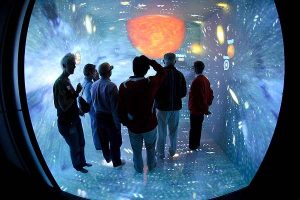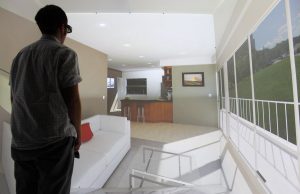
The Virtual Environments Group (formerly the Living Environments Laboratory) is a space and a place where scholars explore the connections among environment, technology, human action, experience, and visualization.
We represent a multidisciplinary group of faculty and students who share an affinity for incorporating 3D design, visualization, and virtual reality environments into education, research and creative expression. Our primary instrument for research is a six-sided virtual reality CAVE.
We engage in projects with departments such as Industrial and Systems Engineering, Design Studies, Library and Information Studies, Nursing, Art, Dance, as well as projects in Digital Humanities. We are developing a broader intellectual foray by expanding our repertoire of the types of scientific and scholarly data we analyze and visualize. We welcome collaborators from across campus, the state, and the nation to join in this endeavor through data acquisition, visualization practices and 3D data analysis.
 Virtual Environments explores how technology shapes health in everyday living and how to use this understanding to create technologies that better fit into everyday lives. In Project HealthDesign, they partner with teams across the country to build computer tools that help people monitor health in everyday living and share those observations with their clinicians. In the new School of Nursing building, a state-of-the-art, fully instrumented apartment will allow scientists, clinicians and people to see and test the technologies of the future that will improve life today.
Virtual Environments explores how technology shapes health in everyday living and how to use this understanding to create technologies that better fit into everyday lives. In Project HealthDesign, they partner with teams across the country to build computer tools that help people monitor health in everyday living and share those observations with their clinicians. In the new School of Nursing building, a state-of-the-art, fully instrumented apartment will allow scientists, clinicians and people to see and test the technologies of the future that will improve life today.
Assistant Professor Kevin Ponto’s research is focused on advancing the field of virtual reality, ranging from creating novel and natural interfaces for immersive virtual environments to developing methods, techniques and tools to better understand, evaluate and develop interactive virtual experiences. The challenges and benefits of this research span across many disciplines, continuing Ponto’s passion for working in interdisciplinary environments.
Assistant Professor Karen Schloss investigates how observers make predictions about objects and entities based on their cognitive and emotional responses to perceptual information. She is currently focusing on how people’s associations with colors influence cognitive processing in three broad areas: (1) aesthetic response, (2) judgment and decision making, and (3) interpretation of information visualizations. In doing so, she takes an empirical approach to design, with the goals of understanding how to communicate effectively through visualizations and what determines affective response to perceptual features.

You must be logged in to post a comment.